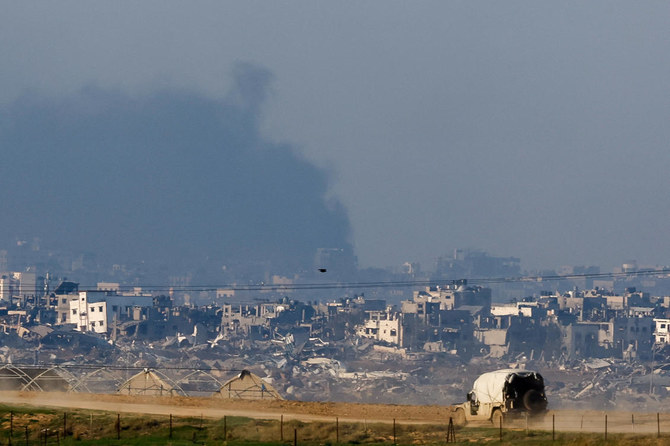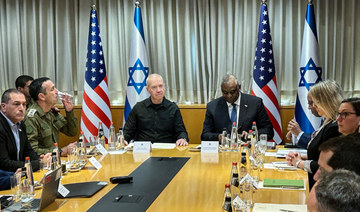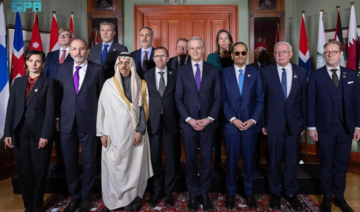CAIRO: The leader of Hamas paid his first visit to Egypt for more than a month on Wednesday, a rare personal intervention in diplomacy amid what a source described as intensive talks on a new ceasefire to let aid reach Gaza and get more hostages freed.
Hamas leader Ismail Haniyeh, who normally resides in Qatar, typically wades publicly into diplomacy only when progress seems likely. He last traveled to Egypt in early November before the announcement of the only deal on a ceasefire in the Gaza war so far, a week-long pause that saw the release of about 110 of 240 hostages taken by Hamas in its Oct. 7 rampage into Israel.
Islamic Jihad, a smaller Palestinian militant group which is also holding hostages in Gaza, said its leader would also visit Egypt in coming days to discuss a possible end to the war.
A source briefed on negotiations said envoys were discussing which of the hostages still held by Palestinian Islamist militants in Gaza could be freed in a new truce, and what prisoners Israel might release in return.
Israel was insisting all remaining women and infirm men among hostages be released, the source said, declining to be identified. Palestinians convicted of serious offenses could be on the list of prisoners to be freed by Israel. The source described the negotiations as intensive and said a breakthrough could be possible within days.
But there remains a huge gulf between the two sides’ publicly stated positions on any halt to fighting. Hamas rejects any further temporary pause and says it will discuss only a permanent ceasefire. Israel has ruled that out, and says it will agree only limited humanitarian pauses until Hamas is defeated.
“Hamas’ stance remains: they don’t have a desire for humanitarian pauses. Hamas wants a complete end to the Israeli war on Gaza,” a Palestinian official said.
NETANYAHU DEFIANT ON CEASEFIRE CALLS
Haniyeh was “in Cairo today to listen to whether Israel has made new proposals or whether Cairo has some too. It is early to speak of expectations,” the Palestinian official said.
Israeli Prime Minister Benjamin Netanyahu, in remarks that suggested any new truce under consideration would be short-lived, repeated that the war would end only with Hamas eradicated, all hostages freed and Gaza posing no more threat.
“Whoever thinks we will stop is detached from reality...All Hamas terrorists, from the first to the last, are dead men walking,” he said in a statement on Wednesday.
Israel has faced increasing pressure from its Western allies to curb a military onslaught in Gaza that has laid waste to much of the densely populated coastal enclave in retaliation for the Hamas killing and kidnapping spree on Oct. 7.
Washington, Israel’s closest ally, has publicly called over the past week for it to scale down its all-out war into a more targeted campaign against Hamas leaders and end what US President Joe Biden called “indiscriminate bombing.”
In a serious spillover from the war, Yemen’s Houthi forces have been firing missiles and drones at commercial shipping in the Red Sea to underline support from Iran’s Arab militia proxies for the Palestinians against Israel, and the US this week set up a multinational force to ward off the attacks.
On Wednesday, the Houthis’ leader warned they would strike US warships if their forces were targeted by Washington.
UN VOTE DELAYED
Inside Gaza, Reuters saw wounded victims of Israeli bombing, including at least two small children covered in blood and dust, carried into the Nasser hospital in the southern city of Khan Younis. At the hospital morgue, women wearing black abaya robes wailed by bodies laid out in black bags and white shrouds.
At the UN Security Council, where Washington has twice used its veto to shield Israel from international demands for a ceasefire, negotiators put off a vote on the latest resolution for another day in hope of reaching an agreed text.
Since the last truce collapsed on Dec. 1, the war has entered a more intensive phase, with ground combat previously confined to the northern half of the Gaza Strip now spread across the length of the territory.
Israel has sworn to defeat Hamas, which rules Gaza, since its fighters killed 1,200 people and captured 240 hostages, according to Israeli tallies, on Oct. 7. Gaza health officials say nearly 20,000 people have since been confirmed killed in Israeli strikes, with thousands more believed lost and buried under rubble.
In the north, which Israeli forces claimed to have largely subdued last month, fighting has been fiercer than ever. Flames and smoke towered into the sky as seen from across the boundary fence in Israel, as Israeli warplanes pounded the area at dawn.
The Palestinian Red Crescent said Israeli forces had besieged its ambulance depot in Jabalia, a northern settlement that has been embattled for weeks. There are 127 people in the facility including workers, displaced people and wounded.
In the south, where most civilians are now sheltering after fleeing other areas, there has been intense fighting around the center of Khan Younis, which Israeli forces have partly stormed.
“All night, the bombing didn’t stop. Their focus now is Khan Younis. People here have to deal with two wars all the time, bombing and hunger,” said Samir Ali, 45, a father-of-five from Gaza City in the north now sheltering in Khan Younis.
Hamas’ armed wing said a number of Israeli soldiers were killed and wounded when militants detonated a booby-trapped shaft of a tunnel east of the city.
Israel says it does what it can to shield civilians, including warning them in advance of strikes, and that Hamas is to blame for harm to them by operating in their midst. Hamas denies this.
International aid groups say the enclave’s 2.3 million people have been driven to the brink of catastrophe by wholesale destruction that has left displaced 90 percent of them and left many malnourished and gravely short of clean water and medical care.
























